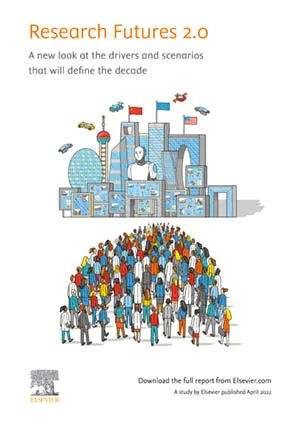The future of research revealed
2022年4月20日
Adrian Mulligan別

Researchers lay bare the challenges and opportunities they face in a post-COVID world
The research ecosystem has been undergoing rapid and profound change, accelerated by COVID-19. This transformation is being fueled by many factors, including advances in technology, funding challenges and opportunities, political uncertainty, and new pressures on women in research.

At Elsevier, we have been working with the global research community to better understand these changes and what the world of research might look like in the future. The results were published today in Elsevier’s new Research Futures Report 2.0
Download the reportCommenting on the report, Elsevier Research Director Adrian Mulligan said:
It’s clear from the results of the Research Futures Report 2.0 that we’re at a point of change. There is uncertainty and added pressures on the research community because of the pandemic. Universities, governments, research information providers, and funders working collaboratively are best positioned to help researchers manage that pressure.
Despite this uncertainty, researchers also believe there are long-term opportunities, most notably new levels of collaboration and openness across the research community, plus new sources of funding and technologies, which can help create a bright future for research.

Adrian Mulligan talks about the previous Research Futures report with colleagues in New York.
The report builds on a previous Research Futures study in 2019, carried out with the global research agency Ipsos MORI to gather predictions from funders, publishers, technology experts and researchers on what research might look like in 10 years’ time. The aim of the Research Futures project is to gather the views and opinions of researchers across the world to help us better understand the challenges and opportunities they face. Elsevier will use these insights to look at steps we could take to better support the research community in the future.
One point is clear: we can best prepare for the future by working together.
Key findings
Publishing moves faster, with more open knowledge
The Research Futures Report 2.0 shows that the past two years have driven progress in both speed and openness in the communication of research. Around two-thirds (67%) of researchers globally now consider preprints a valued source of communication, up from 43% before the pandemic — a shift likely driven by the increased role of preprints in finding ways to tackle COVID-19. While preprints are becoming more popular, they have not benefited from the pivotal role of peer review or had any additional value added to them by publishers. For example, 94% of version-of-record articles published in Elsevier journals have content changes made during the editorial process, and 13% of submissions go through major changes, according to 2021 Elsevier data. Also, 54% of respondents said they planned to publish open access, 6% higher than in 2019.
Funding is harder, but new opportunities emerge
Despite COVID spotlighting the importance of research, funding continues to be a major challenge for researchers, with half (50%) stating there is insufficient funding available in their field. Just one in four (24%) researchers believe there is enough funding for their work; worryingly, this figure has declined from nearly one in three (30%) in 2020. Researchers cite fewer funding sources, increased competition, changing priorities and the diversion of funds to COVID-19 related fields.
Looking ahead, researchers expect more money for research to become available from businesses, with 41% believing that corporate funding for research will increase. Government funding has also increased as a proportion of research budgets since 2019, which has led to a growth of funding across various subjects. For example, Materials Science research has seen the biggest growth in funding satisfaction in 2021, with 35% saying available funding is sufficient — almost triple the percentage (12%) who were satisfied with funding levels in 2020.
Women in research face new pressures — and adapt
While women in research were faster to adapt during the pandemic, they still face unique challenges. Elsevier’s research shows that they are:
Expecting to collaborate more than they did before the pandemic: 64% expect to increase work with researchers across different scientific disciplines, up from 49% in 2020.
Embracing technology faster than their male counterparts: 53% of women scientists think the use of technology in research will accelerate over the next 2 to 5 years versus 46% for men.
More likely to have shared their research with the wider public than men: 60% of women versus 55% of men have shared their research publicly.
Women reported having less time to do research during lockdowns, which could slow or hamper their future career prospects. 62% reported they were finding it difficult to find a good work-life balance during the pandemic, compared to just 50% of male researchers — a trend which could have significant negative long-term effects on the careers of women in research.
Researchers are collaborating more
As teaching, publishing and funding accelerate and increase the pressure on researchers, how they work has changed — and not necessarily for the worse. Researchers are collaborating more. Just over half (52%) state that they are sharing more research data now than 2 to 3 years ago, and the number of researchers who say they are collaborating more than in the past has grown to 63% from 48% pre-pandemic. The gains are across geographies and disciplines. Researchers in Computer Science have seen the biggest rise, with 76% agreeing that there is more collaboration involved in their projects than previously — a substantial rise from the 41% who agreed pre-pandemic.
More researchers are embracing AI
AI has been embraced more than ever during the past two years, though some caution remains. 16% of researchers are extensive users of AI in their research, and while high take-up in Computer Sciences skews that number (64% of computer scientists are heavy users), attitudes across a number of specialties have grown more positive. In Materials Science, which covers the structure and properties of materials and the discovery of new materials and how they are made, 18% are now likely to be extensive users of AI in their research, up from zero a year ago; in Chemistry, the number has grown from 2% to 19% and, in Maths, from 4% to 13% since 2020. Attitudes towards the use of AI in peer review is perhaps where we have seen the greatest shift in attitude: 21% of researchers agree they would read papers peer reviewed by AI — a 5-percentage point increase from 2019. Those age 55 and under are the most willing to read AI-reviewed articles (21%), while those age 56 and over have increased their willingness compared to a year ago (19%, up from 14% last year). At the same time, most researchers surveyed continue to object to AI peer review, with almost two in three unwilling to read such articles (58 percent) — a similar proportion as in 2020.

Project methodology
In total, over 2,000 researchers responded to two separate global surveys: 1,173 researchers responded in July-August 2021 and 1,066 in July 2020. Responses have been weighted to be representative of the global researcher population by country (UNESCO/OECD data). Base sizes shown in this report are unweighted unless otherwise stated. The full methodology is available in the report.
